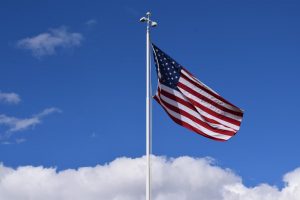The Pledge is unconstitutional
January 20, 2021
The daily recitation of the Pledge of Allegiance violates the separation of church and state, a keystone of our nation’s foundation.
The First Amendment of our Constitution states, “Congress shall make no law respecting an establishment of religion.” The Pledge is an establishment of religion. It literally says “under God”. That’s religion. We say it every day, and it’s blasted over the loudspeakers. That’s establishment. In a public, government-run school. Hence unconstitutional. When schools have students regularly recite the Pledge of Allegiance, they are going against the Constitution they teach us in our history and government classes.
Some might argue that saying the Pledge doesn’t really hurt anybody, and kids don’t have to say it if they really don’t want to. This is wrong in many cases. Kids have been kicked out of school for not standing for the Pledge. That means that somebody decided that patriotism was more important than education, which is just flat-out wrong.
(In 2018, a high school girl in Texas was expelled for sitting during the Pledge. Read about it here. Click here for another case involving suspension in Pennsylvania and here for in the Boulder Valley School District.)
But even if most schools don’t punish students for Pledge-related “violations”, it’s still unlawful. Setting aside time to say the Pledge of Allegiance is essentially the same thing as prayer in schools because, as I explained before, both are pushing religious opinions onto kids. The Supreme Court deemed prayer in schools unconstitutional in Engel v. Vitale. In this case, some people in New York said it was ok to have a voluntary prayer at the beginning of each school day, but some other groups got upset about this and brought it to the Supreme Court. The Court said that even though the prayer was optional and didn’t subscribe to a particular religious denomination, it was still unconstitutional because it was still an establishment of religion. This should also apply to the Pledge because, though voluntary and non-denominational, it’s still inherently religious.
Even if we just got rid of the phrase “under God”, the Pledge would still be unconstitutional. Forcing people to think a certain way is against the Constitution and, y’know, the core values of our country. All Americans have the protected right to be unpatriotic, including the students of public schools. That right is taken away when students are forced to say the Pledge of Allegiance.
School is for education, not indoctrination. School is where people learn enough to make informed opinions, not have someone else’s opinion pushed onto them. And yes, the Pledge is an opinion. With words like “liberty and justice for all” characterizing a country where the wage gap is a thing and Black people are three times more likely to be killed by the police than whites, it’s definitely not as factual as a times table. Our country may be working towards complete equality for everyone, but claiming our current system gives “liberty and justice” to everyone dismisses the struggles of marginalized groups that are still fighting for equality. The idea that there is “liberty and justice for all”, that we don’t have a lot to work on, is misleading to public schools students
We learn the Constitution at school only to violate it every day when we recite the Pledge. Ending the Pledge in public schools would eliminate this hypocrisy we present to American students.



Laila • Mar 3, 2021 at 2:56 pm
Great job! It was interesting to read your responses to potential counter-arguments and the piece as a whole was very thorough.
Arizona Lee • Mar 3, 2021 at 10:50 am
Very well researched and well written! I enjoyed reading this and gaining some insight on this perspective. You brought up some valuable points and linked in relevant, helpful, interesting court cases. Great job!!